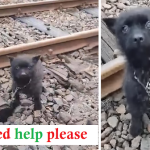A dog was saved from railroad tracks by rescuers final month, narrowly stopping a tragedy. Now, this fortunate pooch is the recipient of even higher information.
On March 30, the Metropolis of San Antonio Animal Care Providers reported a “Miracle on the Tracks.” Animal Care Officer Edwards obtained a criticism a couple of dog that was unable to free himself and was chained to a transferring practice observe.
When Officer Edwards acquired there, he instantly began working to launch the Labrador, who was mendacity on the tracks. The dog’s leash was fixed to the rail, conserving him from escaping and turning into extra restrictive as he made an try to take action.
The policeman made an effort to win the terrified animal’s belief. He then eliminated the dog from the observe “rapidly and safely.”
Simply earlier than a practice was about to hurry down the observe, he fortunately managed to free the dog. The dog would have tragically perished if the officer hadn’t proven up when he did.
It is unclear whether or not the dog was connected to the observe on objective or if he merely acquired trapped on a nail. In any case, everybody was simply grateful {that a} disaster was averted and the pet was saved in time. The dog was fittingly christened “Fortunate” by animal care companies.
Fortunate would wish a while to “cool down,” they stated on the time, however would quickly be positioned up for adoption.
“As quickly as I noticed him, I knew he was the form of dog my household would get together with. The brand new proprietor, recognized within the submit as Mr. C, praised the brand new tenant’s calm and unfazed demeanor.
Earlier than adopting Fortunate, the shelter claimed that Mr. C took him outdoors to their play yards. They acquired alongside nicely and agreed they had been a great match.
Fortunate was neutered and given a microchip, in accordance with Animal Care Providers, earlier than going to his new house. Moreover, they are saying that Fortunate’s new house owners have modified his title to “Duke.”
Caring for animals involves various aspects to ensure their well-being and happiness. Here are some detailed methods for animal care:
- Proper Nutrition: Providing balanced and appropriate nutrition is essential for the health of animals. Consult with a veterinarian to determine the best diet for your specific animal, considering factors like age, species, and health status. Ensure access to clean water at all times.
- Regular Exercise: Just like humans, animals need regular physical activity to stay healthy. Make sure they have enough space to move around and engage in natural behaviors. For pets like dogs, daily walks and playtime are crucial.
- Routine Veterinary Care: Schedule regular check-ups with a qualified veterinarian to monitor your animal’s health and address any issues promptly. Vaccinations, parasite control, and dental care are all important aspects of veterinary care.
- Safe Environment: Create a safe and comfortable environment for your animals. This includes shelter from extreme weather conditions, protection from predators (if applicable), and providing appropriate bedding or housing materials.
- Socialization: Many animals are social creatures and require interaction with conspecifics or humans. Ensure that they have opportunities for socialization to prevent loneliness and behavioral issues.
- Grooming: Regular grooming helps maintain the health and appearance of animals. This includes brushing their fur or feathers, trimming nails, and cleaning ears and eyes as needed. Some animals may require professional grooming services.
- Mental Stimulation: Enrichment activities are essential for keeping animals mentally stimulated and preventing boredom. Provide toys, puzzles, or other forms of enrichment to keep them engaged and prevent destructive behaviors.
- Training and Behavioral Management: Proper training is crucial for pets to understand boundaries and follow commands. Positive reinforcement techniques are generally the most effective and humane way to train animals.
- Monitoring Health Signs: Learn to recognize signs of illness or distress in your animals, such as changes in appetite, behavior, or physical appearance. Promptly address any concerns by consulting with a veterinarian.
- Responsible Breeding and Ownership: If you’re involved in breeding animals, do so responsibly, prioritizing the health and welfare of both the parents and offspring. Additionally, only adopt or purchase animals if you can provide them with a lifelong commitment of care.
- Environmental Conservation: For animals in the wild or those in captivity, supporting conservation efforts and advocating for their protection is crucial. This includes preserving natural habitats, combating wildlife trafficking, and supporting ethical wildlife tourism.
- Legal Compliance: Familiarize yourself with relevant laws and regulations pertaining to animal care and welfare in your area. Ensure that you meet all legal requirements for owning or caring for animals.
By following these detailed methods, you can ensure that the animals under your care lead healthy, happy lives.




